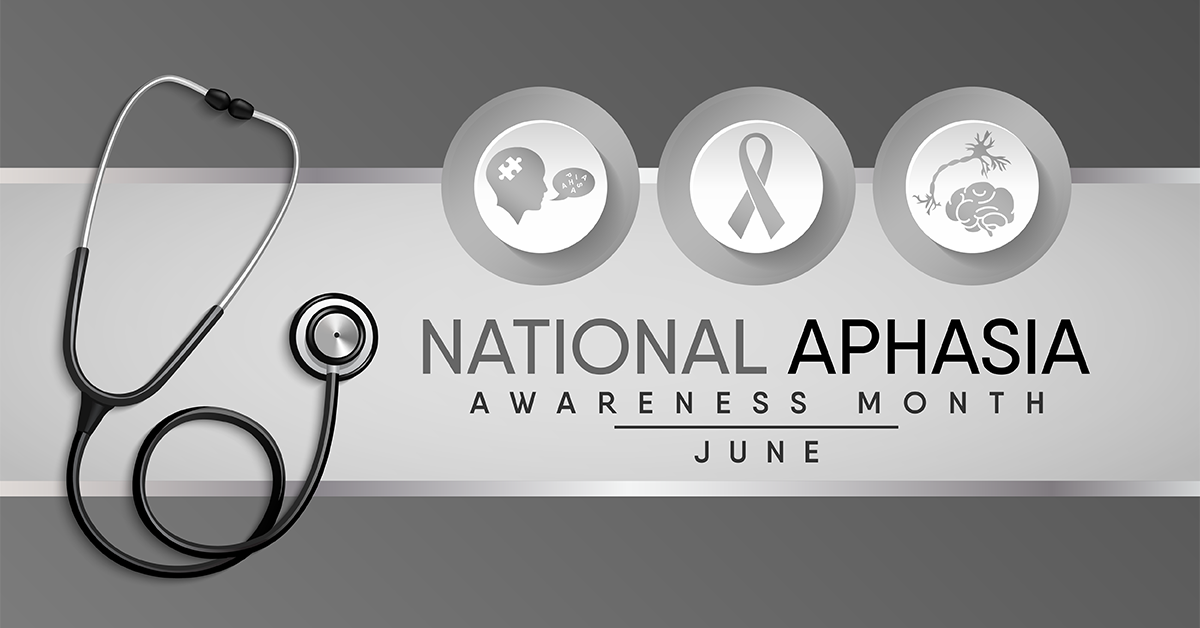
Aphasia is an impairment language caused by an injury to the brain, usually due to stroke. There are several types of aphasia that affect language skills in different ways. According to the National Aphasia Association (NAA), 2 million people in the United States have aphasia and have lost all or some ability to use words. However, almost 85% of Americans say they’re not familiar with the term aphasia. That’s why Aphasia Awareness Month in June is so important.
Quick Facts About Aphasia
- Aphasia is an impairment of language that can affect both the production and comprehension of speech and impair a person’s ability to read and/or write.
- Aphasia is always caused by an injury to the brain
- Stroke is the most common cause of brain injury that leads to aphasia
- Other brain injuries from head trauma, infections, or tumors can also cause aphasia
- Aphasia can be mild and only affect a single aspect of language OR
- It can be so severe that is incredibly difficult to communicate with the patient
- Most commonly, multiple aspects of communication are impaired
- Some people can recover from aphasia, but if they have it longer than 2 or 3 months it is unlikely they will recover
Visit the National Aphasia Association for more facts about the condition and tips for communicating with someone with aphasia.
Types of Aphasia
1. Global Aphasia
Global aphasia is the most severe type of aphasia. It is caused by injuries to multiple parts of the brain that are responsible for processing language. Patients with global aphasia can only produce a few recognizable words. They can understand very little or no spoken language. However, they may have fully preserved cognitive and intellectual abilities that are not related to language or speech. Global aphasia may be apparent immediately following a stroke or brain trauma. While this type of aphasia can improve as the brain heals, there may be lasting damage.
2. Broca’s Aphasia
Broca’s aphasia is also called non-fluent or expressive aphasia. Patients with Broca’s aphasia have partial loss of their language ability. They have difficulty speaking fluently and their speech may be limited to a few words at a time. Because they can only get a few words out at a time, their speech is described as halting or effortful. They are usually able to understand speech well and maintain the ability to read but may have limited writing abilities.
3. Mixed Non-Fluent Aphasia
Patients with this type of aphasia have limited and effortful speech, similar to patients with Broca’s aphasia. However, their comprehension abilities are more limited than patients with Broca’s aphasia. They may be able to read and write, but not beyond an elementary school level.
4. Wernicke’s Aphasia
Wernicke’s aphasia is also called fluent aphasia or receptive aphasia. It is referred to as fluent because while these individuals have an impaired ability to comprehend spoken words, they do not have difficulty producing connected speech. However, what they say may not make a lot of sense and they’ll use nonsense or irrelevant words in their sentences. Often, they do not realize that they are using the incorrect words. Someone with Wernicke’s aphasia will probably have an impaired ability to read and write and lose much of their language comprehension ability.
5. Anomic Aphasia
A person who suffers from anomic aphasia is unable to come up with the right words for what they want to talk about. They have a grasp on grammar and speech output, but they simply cannot find the words to discuss what they want to. When they speak, it is often vague and they might seem like they are “talking around” the thing they can’t describe. They also have difficulty finding words when they write.
6. Primary Progressive Aphasia (PPA)
PPA is a neurological syndrome in which someone loses their ability to use language slowly and progressively. While most other forms of aphasia are caused by stroke, PPA is caused by neurodegenerative diseases like Alzheimer’s Disease. PPA progresses as the tissue in the language centers of the brain deteriorates over time. Because this form of aphasia is associated with degenerative disorders, PPA is eventually accompanied by other symptoms of dementia or memory loss.
Regional Neurological Associates is happy to report we are reopening to see patients in-office. Patients can now make same-day appointments and expect to be treated with the best care and attention. Our current office hours are: Monday – Friday from 9 am – 4 pm. If you have questions or concerns about your neurological health, call us at (718) 515-4347 to make an appointment.
While we are pleased to be seeing patients in the office again, we ask that anyone experiencing symptoms like fever, cough, or shortness of breath reschedule your appointment or schedule a telemedicine appointment. Please contact our office to change your in-person visit to a Telehealth visit (718) 515-4347.


